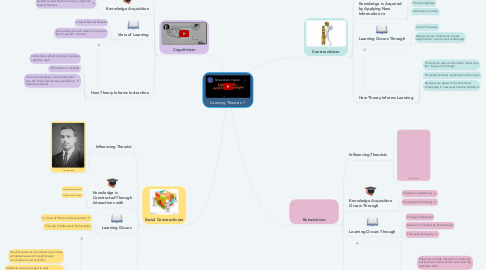
1. Cognitivism
1.1. Influencing Theorists
1.1.1. Alan Baddeley
1.1.2. Jean Piaget
1.2. Knowledge Acquisition
1.2.1. Best Accomplished by reducing cognitive load of learners
1.3. View of Learning
1.3.1. Internal Mental Process
1.3.2. Is the ability to recall stored information from long-term memory
1.4. How Theory Informs Instruction
1.4.1. Instructors scaffold material to reduce cognitive load
1.4.2. Information is chunked
1.4.3. The Instructor takes into consideration how the brain and memory work (brain based education)
2. Social Constructivism
2.1. Influencing Theorist
2.1.1. Lev Vygotsky
2.2. Knowledge is Constructed Through Interactions with
2.2.1. Learning Environment
2.2.2. Collaborative Partners
2.3. Learning Occurs
2.3.1. In Zone of Proximal Development
2.3.2. Through Collaborative Partnerships
2.4. How Theory Informs Instruction
2.4.1. Teacher serves as a facilitator to promote collaborative work through shared conversations and activities
2.4.2. Students are encouraged to work collaboratively to construct their knowledge to solve a problem as a group
3. Behaviorism
3.1. Influencing Theorists
3.1.1. B.F. Skinner
3.2. Knowledge Acquisition Occurs Through
3.2.1. Operant Conditioning
3.2.2. Classical Conditioning
3.3. Learning Occurs Through
3.3.1. Change in Behavior
3.3.2. Behavior is Shaped by Environment
3.3.3. Theory of Contiguity
3.4. How Theory Informs Instruction
3.4.1. Educators arrange classroom or learning environment to be conducive to learning particular skills
3.4.2. Repetition and reinforcement are used to learn concepts
4. Constructivism
4.1. Influencing Theorists
4.1.1. Lev Vygotsky
4.1.2. Jean Piaget
4.1.3. John Dewey
4.1.4. Jerome Bruner
4.2. Knowledge is Acquired by Applying New Information to
4.2.1. Prior Experience
4.2.2. Prior Knowledge
4.2.3. Individual's Culture
4.3. Learning Occurs Through
4.3.1. Active Processes
4.3.2. Applying new information to past experiences, culture, and knowledge
4.4. How Theory Informs Learning
4.4.1. The teacher acts as a facilitator rather than the "sage on the stage"
4.4.2. Promotes students' exploration of the topic
4.4.3. Students are asked to construct their knowledge in new ways to solve problems

